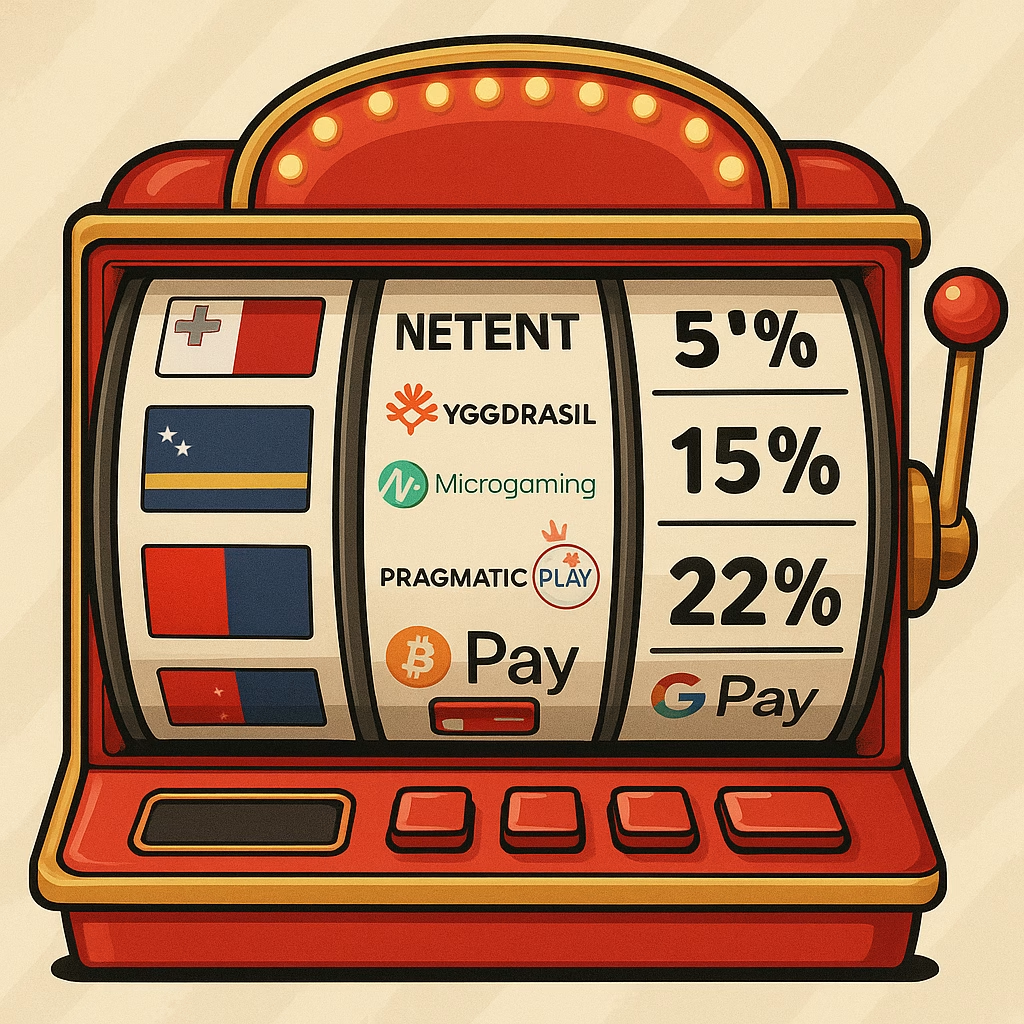Launching a new online casino is considered a complex task. The choice of jurisdiction will determine your legal compliance, along with the gambling regulations you are expected to follow. Once you settle on a market, you would be able to apply for a gambling license, a lengthy process, but your biggest hurdle in launching a new gambling site.
Once your license is complete, you would need to think about the design of your brand new casino, keeping in mind both UX and gamification. Software providers build up the library in your gaming arena, whilst marketing, promotions and affiliates are also big part of your journey.
Choosing your Gaming License and Market
There is an extensive list of worldwide regulatory authorities that oversee gaming within their jurisdiction. If gambling is legal within a country, an authority would most likely operate to oversee the gambling operations within the state. Depending on which country you intend to operate, a gambling license is always needed to operate an online casino website.
Today we take a closer look at some of the most prominent licensing hubs in the world. If you intend to operate within the country, albeit online, you would still need to be in possession of a remote gaming license.
United Kingdom Gambling Commission – UKGC
The UKGC is one of the most respected and prominent gambling licenses in the business. Once a potential operator applies for a UKGC license, the applicant can expect to undergo a selection of interviews, meetings and also an in-depth KYC / AML process.
Casinos that intend to conduct business and operate a site in the UK markets (England, Scotland and Wales) are all subject to a UKGC license. Applications can be submitted online, where a caseworker is assigned to evaluate and assist throughout the application process. Some of the information needed in support of the application include: Group Structure Diagrams, Share Certificates, Partnership Agreements, Policies and Procedures, Rules of Play Operational Models and many more. Applicants are expected to pay an application fee, along with an annual fee in line with licensing.
Taxation in the United Kingdom
- Remote Gambling Duty (RGD) – 21% of Gross Gaming Yield (GGR)
- Annual Gambling License Fee for online casino (1st payment due 30 days from the issue of the UKGC gaming license being issued)
- Standard UK Corporate Tax – 25% for all UK based companies.
Malta Gaming Authority – MGA
The MGA is a world renowned gambling license that is based in Malta. A very sought after licensing body that regulates a variety of sectors within the gambling industry, including online casinos. Applying for a license with the MGA is also a lengthy process, with the authority advising potential owners of best practices, how to protect minors and also how to offer a fun gambling experience in a regulated market.
Once an online gambling license is approved by the MGA, casino owners are expected to fork out an annual fee to uphold the license. The governing body is strict when it comes to problem gambling and compliant resolution, with annual reviews expected on licenses holders.
Taxation in Malta
- Annual MGA license fee
- Gaming Tax – Listed at 5% on GGR derived from gameplay.
- Corporate Tax – A 35% tax rate for all companies listed in Malta. Still, Malta’s imputation and refund tax system could see the company pay less tax rates.
Curaçao Gaming Control Board – CGCB
The CGA was founded in 1999 and quickly became the gaming regulator for the entire gambling industry operating in Curacao. All land and online casinos operating from the region would need to apply for a CGCB license before launching an online gambling site.
The regulator is a popular choice for many online casinos that opt to offer players the option to use crypto currencies. Whilst the UKGC and the MGA are not so lenient with crypto currency usage, the CGCB supports the option.
License holders would also be expected to pay an annual fee in lieu with licensing, which is relatively less compared to the UKGC and MGA fees. Also, the CGCB has a more lenient approach to rules and guidelines, compared to other regulators.
- Lower corporate tax compared to other countries. Currently gambling entities pay a 2% tax on casino earnings.
- Licensing fees paid annually, with lower fees compared to EU regulators.
- No Gaming Duty on GGR (only standard corporate taxation applies)
Choosing your Online Casino Software
Online casinos run on a web application that is powered by casino software. There are many worldwide companies to partner up with in terms of casino software. Some of the most sought after names include Limeup, Softswiss and Gamma stack.
The casino software will be developed with modules that are accessible to different teams running departments within the casino. Casino software modules available to new online casino include:
- Content Management Systems
- Promotional and Bonus Tools
- Game Management Modules
- Data Reporting
- Administrator rights and roles assignments
- Payment Incorporation System
- Affiliate Management and Tracking System
- Anti Fraud Management Tools
- KYC Systems
- Email and Player Communication Tools
Some casino software companies offer the above as a package, or new casinos can choose which options to incorporate. Many casinos also opt to create their own software, and use external companies to incorporate some of the above listed modules. KYC and Anti Fraud systems are not optional modules, and required to uphold gambling licenses such as the MGA and the UKGC.
Opening a Merchant and a Corporate Bank Account
Standard banks are sometimes reluctant to associate themselves with gambling businesses. This is due to reputational risk, regulatory risk and chargebacks initiated by problem gamblers. Still, online casinos are expected to have a traditional Corporate Bank Account tied with the casino. This fund will depict all the casino’s losses and learnings, with the account being subject to annual audits by the licensing body.
Casino companies setting up business would need the following documentation to successfully open a Corporate Bank Account:
- Company Incorporation Documents
- Copy of the Gambling Licenses held
- Business Plan with financial targets are forecasting charts
- The UBO’s Proof of Address and ID / Passport (Both of these documents would need to be certified)
- Anti Money Laundering (AML) Procedures
- Know Your Customer (KYC) Procedures
- Source of Funds Evidence
A merchant account is also needed for the casino to receive deposits and pay winnings to casino players. Gambling sites would need to team up with a selection of payment methods to cater for players. Payment providers that are commonly found at online gaming sites include:
Credit Cards and Debit Cards
Visa, Mastercards and sometimes Maestro is offered.
Bank Transfers
SEPA for European Transfers
Swift for International Transfers
E-wallets
- Paypal
- Skrill
- Jeton
- MiFinity
- Google Wallet
- Neteller
- Skrill
- ecoPayz
Cryptocurrencies
(Note that not all Gambling Licenses support the usage of cryptocurrencies at gambling sites)
- Bitcoin (BTC)
- Ethereum (ETH)
- Tether (USDT)
- Litecoin (LTC)
- Ripple (XRP)
The below are payment options commonly handled by cryptocurrency gateways:
- CoinsPaid
- BitPay
- CoinPayments
- NOWPayments
Prepaid Card Options
- Paysafecard
- Neosurf
- AstroPay
- Flexepin
Mobile Payments
- Apple Pay
- Google Pay
- Boku
- Zimpler
Game selection at Top Online Casino Sites in 2025
Game selection at an online casino is the site’s backbone. Some plays might be attracted to traditional slot games, whilst others are after the thrills that live table gaming offers. A great casino team always caters for every type of player and this is done by offering an extensive game selection.
Most new sites start off their journey with a small number of game providers, with all games running on HTML5 technology. HTML5 is popular in the gambling scene as it offers players better UX, via enhanced graphics and extensive game features. Most games that run with HTML will also be available to view and play via mobile devices, making game content more attractive for the consumer.
Game Variety
Slot Machines (sometimes referred to as online slot games or video slots) – Classic Slots (3 Reel slots), Video Slots (5 Reel Slots), Bonus Game Slots, Fixed Jackpot Games, Progressive Jackpot Games, Cascading Reels features, Cluster Pays Slots, Megaways Slots, branded slot games, multiple payline slots,
Table Games (non live) – Blackjack, Poker, Roulette, Baccarat, Craps, Sic Bo and Dragon Tiger.
Live Casino Games (tables operated by live dealers) – Blackjack, Poker, Roulette, Baccarat, Craps, Sic Bo and Dragon Tiger.
Live Game Show Games (operated by live dealers) – Crazy Time, Lightning Storm, Fireball Roulette, Ice Fishing, Monopoly Live, Funky Time, Marble Race, Crazy Balls, Crazy Pachinko, Balloon Race, Extra Chilli Pepper Spins, Monopoly Big Baller, Lightning Roulette, Super Color Game, Imperial Quest, Dream Catcher, Football Studio and Deal or No Deal.
Some game providers can be directly integrated within the casino sites. Deals between game providers and online casinos result in the casino acquiring and offering games by the developer at the online casino. Alternatively, online casinos can opt to partner up with a software provider that comes along with a selection of games already integrated within the software.
Prominent game providers that are pioneers in the game development arena include NetEnt, Evolution Gaming, Yggdrasil, Microgaming, Pragmatic Play, Wazdan, Nolimit City, Greentube, Playtech, Hacksaw Gaming, Booming Games, Beefy Games, Play’n’Go, ELK Studios, Thunderkick, Relax Gaming, Spinomenal, Blueprint Gaming and many more.
*Pragmatic Play and Evolution Gaming also offer live table gaming options.
Bonuses and Marketing Campaigns
Marketing is an essential tool in the casino business. Prior to launching the site, most casino teams attend gaming conventions to strike deals with game providers and also spread the word about the new site. Pre Launch marketing also includes media publications, the launch of social media profiles tied to the casino, and affiliate marketing.
A CRM team is the central team in creating campaigns and promotions to attract and retain customers. Most sites offer welcome bonus packages that traditional consist of the following:
100% deposit matches up to X Amount and X amount of free bonus spins.
A casino that is looking for player retention, would go the extra mile and offer deposit matches up to the 5th deposit completed at the site. Other retention strategies include offering players the following reload promotions:
- Deposit match offers
- Live Casino cashback
- Slot Duels
- Weekend Free Spins Offers
- Loyalty Schemes
- Birthday Gifts
Launching an Affiliate Program
One of the best ways to market an online casino is through affiliate marketing. Affiliates are casino targeted sites and individuals that promote casino brands. This is done via casino reviews, sign up links and also game promotion. An affiliate will sometimes run a casino review site or channel, where the site will give an in-depth review of the site, its games, the payment options and even RG tools available. In a nutshell, affiliates market the casino to targeted audiences. Eg. If the casino operates in New Zealand markets, the site would need to team up with affiliates promoting the jurisdiction.
Affiliates also offer you a dedicated casino sign up link, that sometimes offers better promotions than the site itself. In return, the affiliate earns a commission that is based on Revshare (Revenue Share), CPA or a blend of both. Each sign up originating from the affiliate would award the aff company a small %. The benefits of working with affiliates include low marketing costs, high quality player traffic and player retention.
An affiliate program is set up via a module offered by the casino software company. This is a module that can be added post site launch.
Responsible Gaming
Responsible Gambling is a nice feature to have at a site and promotes a positive gaming experience. Whilst RG tools are sometimes listed at legal requirements for licensing purposes (MGA and UKGC), other casinos offer RG tools to mitigate gambling addictions. RG tools commonly found at casino gambling sites include:
Deposit Limits – Setting the amount of money players can deposit per day, per week and monthly.
Loss Limits – Caps the account to a specific loss amount, and stops the player from playing once the loss limit is reached.
Time Limits – Players would be allowed to set the amount of gaming time, and will not be allowed to play once the time limit is reached.
Self Exclusion – Tools that allow the player to voluntarily ban themselves from playing at the casino. This could be set daily, weekly and monthly, and can be reviewed via the Customer Support Team.
Time Out Sessions – Allows the player to take a break from playing at the site for a set amount of time. Time out sessions cannot be reversed.
Wagering Limits – Allows the player to set the amount of money they can wager / play during a gaming session. This feature is also available daily, weekly and monthly.
Other Tools – Including self assessments and links to combat gambling addictions.
Final Thoughts
Launching a new casino takes a substantial amount of time. The initial stages include recruitment, research, licensing, teaming up with game providers and also planning your procedures. Upholding the gambling license is an ongoing process, with many casinos also offering RG tools to players wanting to manage their gambling responsibly.
High level of competition is expected with the casino world being a growing world. Casino teams would be expected to visit iGaming conferences, this includes Sigma Summits (Europe and Latam regions), EGR events, Igaming Awards, Affiliate Summits etc. Such conferences open doors to meeting new game companies, affiliates, payment providers and even Compliance Teams.
Reading and comparing casinos is also a wise idea, to get an overview of campaigns, different promotions, gamification and UX. Keeping the casino fresh, with a sleek design and simple navigation is a must in today’s gaming sphere.





